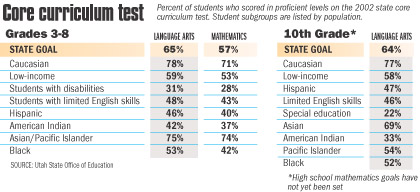Original URL: http://deseretnews.com/dn/view/0,1249,505033631,00.html
Disparity glaring in student test scores
Sunday, May 18, 2003
Deseret News-Utah
By Jennifer Toomer-Cook, staff writer

Ethnic minority, low-income and special education students are going to have to
stretch a lot further than white, middle-class and regular education peers to
reach the bar Utah officials have set for test scores.
As students take the core curriculum test this year, schools are looking at a new goal for how high students ought to score under the federal No Child Left Behind Act.
In third through eighth grades, at least 65 percent of all students should score at proficient levels, according to the new state standards submitted to the federal government.
In math, 57 percent of students should score as proficient. In 10th-grade language arts, 64 percent of students should score at proficient levels.
Benchmarks are not yet available for math tests.
Caucasian students are more likely than minorities to achieve those levels on the spring test. Last year, 78 percent of white third- through eighth-graders scored at proficient levels.
By comparison, 75 percent of Asian-American, 42 percent of American Indian, 46 percent of Hispanic, 48 percent of students with limited English skills, and 53 percent of black students scored at those levels. The same goes for just 59 percent of low-income children and 31 percent of students with disabilities.
High school language arts scores tell a similar story, with 76.6 percent of Caucasian students proficient. The same can be said for just 22 percent of special education students.
The scoring gaps are nothing new.
But a federal law's effect on how schools react to them could be.
True to its name, the No Child Left Behind Act requires every group of students in every school to meet the statewide goal to improve test scores every year. If they don't, the State Office of Education will publish the schools' names, and those schools that receive federal funds for low-income schools will face sanctions.
By 2014, all students in every state must score at proficient levels on state core curriculum tests — a lofty, but worthy goal, state testing coordinator Louise Moulding said.
And like any other high aspiration, there will be plenty of stumbling along the way. Last year, State Superintendent of Public Instruction Steve Laing estimated 60 percent or more of Utah schools would end up on the so-called "failing schools list" sometime before the law runs its course.
But as Moulding sees it, it's good to light a fire under schools' feet, and encourage them to focus their resources on students who need them the most. "It's an important focus, it's important to set as our goals," Moulding said.
"It focuses attention on kids who need the attention, who are not performing well on these academic standards."